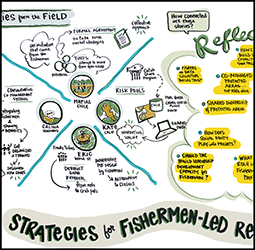Sessions focused around our work partnering with fishermen, industry and local communities to design, test, and implement innovative management approaches and new business models that result in viable local fisheries, stable supplies of seafood and marine conservation. Topics include: assessment methods for data-poor fisheries, rights-based fisheries management, certification and the role of the private sector, and partnerships that leverage sustainable fisheries management.
FISH1: How Can Fishery Stock Assessments Help Improve the Management of Data Poor Fisheries?
Presenters: Richard Hamilton, Jono Wilson, Steven Victor
Description: In this session, participants learned and explored data limited assessment methods for use in managing coastal fisheries. Participants gained an understanding of fisheries science, the current state of global fisheries, novel assessment techniques and an adaptive management framework for decision-making. Presenters provide examples and case studies of the use of these methods for fisheries in Palau, California, Belize and the Solomon Islands. Through facilitated discussion, participants developed solutions for overcoming applied challenges.
References: Session Summary
Jono Wilson: Assessment and management of Belize nearshore fisheries -
Presentation | Assessing and managing fish stocks with limited information -
Presentation
Richard Hamilton: Hyperstablity in fisheries catch data -
Presentation | The role of local knowledge in fisheries management -
Presentation Steven Victor: Data poor stock assessment fisheries management at SRP at size estimate |
Presentation
FISH2: Identifying and Filling Science Needs for Sustainable Fishery Interventions Through Engagement and Collaboration
Presenters: Jay Udelhoven and Carmen Revenga, Sally McGee, Mary Gleason, Raimundo Espinoza, George Maina
Description: This session explored four fisheries-related TNC projects from a scientific collaboration perspective -- two efforts are on the mainland U.S. and are well-established, data-driven, and science-based collaborations that significantly contribute to and support ongoing sustainable fisheries interventions; while two other efforts are outside the U.S. in less developed areas, just emerging, are relatively data poor in terms of fisheries, and as of yet do not have fully developed science-based collaborations.
References: Session SummaryJay Udelhoven: Identifying and filling science needs for sustainable fishery interventions through stakeholder engagement and collaboration |
PresentationSally McGee:
Wicked good partnerships with fishermen to advance marine conservation in New England |
PresentationMary Gleason
: Combining local knowledge and scientific data to reduce bycatch of overfished species in the US West Coast groundfish fishery |
Presentation Raimundo Espinoza:
Engaging fishers in conservation planning the Cabo Rojo Project experience |
PresentationGeorge Maina
:Strengthening fisheries co-management and biodiversity conservation through Community Marine Conservation Areas in Kenya |
Presentation
FISH3: Murky Waters: When Will Private Capital Invest in Fisheries Reform?
Presenters: Larry Band, Bill Ginn, Noah Idechong, and Alex Martinez
Description: There has been a lot of talk of using private capital for fisheries reform, from blue bonds to impact investment and the adaptation of debt-for-nature swap style mechanisms to transform fisheries management. In this session, presenters shared fisheries finance mechanisms through real case studies being developed by TNC as examples to discuss how we can have more investment ready projects in fisheries.
References: Session Summary
FISH4: Strategies for Fishermen-led Reform
Presenters: Erika Feller, Carmen Revenga, Matias Cailloux, Eric Delvin, Calina Zepeda, Kate Labrum

Description: The goal of this session was to explore the Conservancy's work in partnership with and creating incentives for fishermen-led reform. One of our main strategies is to partner with fishers and fishing communities to take the benefits of co-managed fisheries to meaningful scale. This session explored a number of projects - focusing on the Conservancy's niche, the commonalities, challenges, and
effects of these efforts. Several questions were explored during discussion including; What will the project accomplish; How was the project initiated; What does a successful project look like and how will you know when you are done; In what ways will enabling conditions shape the project, or will the project shape enabling conditions or change policy; and What steps/activities have you taken working directly with the private sector?
References: Session Summary |
Graphic Facilitation DrawingErika Feller: Strategies for Fishermen Led Reform |
Presentation
FISH5: How Should TNC Engage with Seafood Certification and Other Eco-labels: Working with the Marine Stewardship Council, Fisheries Improvement Projects and Seafood Watch?
Presenters: Carmen Revenga
Description: This session provided an overview of the two leading certification/ecolabel frameworks out there: the Marine Stewardship Council and Fisheries Improvement Projects. We then looked at two examples of how TNC is engaging with these frameworks and discuss what strategy should we pursue to engage more fully. Through discussion, we explored what engagement can mean for our work and discuss how TNC can play a role or integrate these approaches into our own fisheries strategy and projects.
References: Session Summary
Felicity Burrows: The Bahamas Spiny Lobster Fisheries Improvement Project |
Presentation